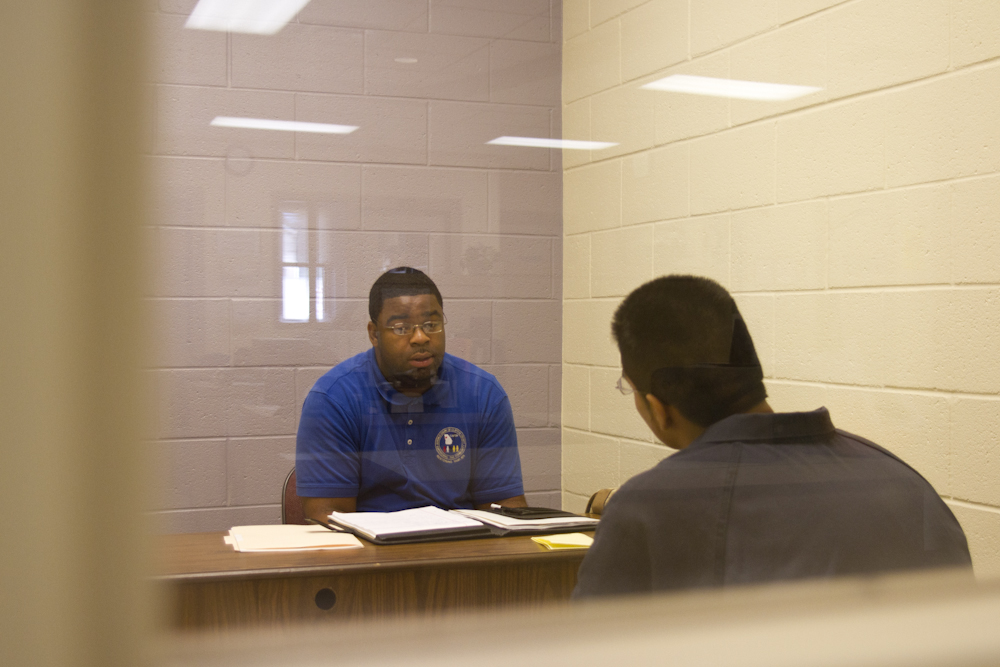
Ronaldi Rollins’ view from his corner office on the third floor is typical of metro Atlanta. A parking lot, some two-story apartment building, all nestled in the middle of a bunch of pine trees. Welcome to Jonesboro, Ga., command central for one juvenile probation officer in charge of 20 struggling teens.
To pay a visit to Rollins, a kid has to make it past two levels of security. First, the metal detector and officer at the front door. Then comes the thick, fiberglass window and receptionist at the third floor waiting room. Just about every door, with the exception of the restrooms, requires a four-digit code to pass.
But probationers showing up unannounced may have a hard time finding Rollins behind his desk.
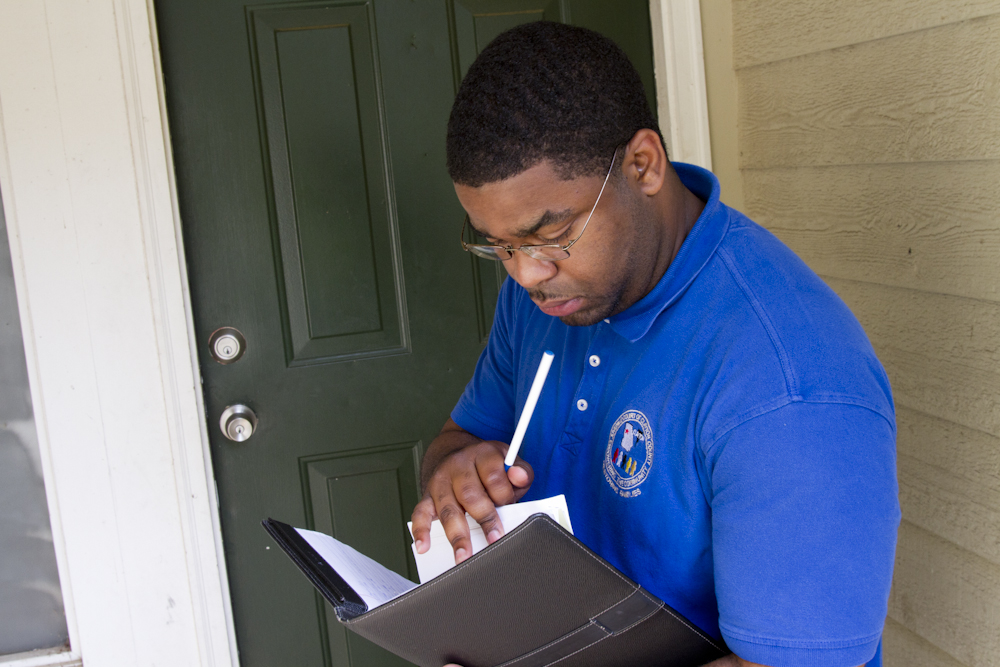
For juvenile probation officer Ronaldi Rollins, keeping tabs on the kids he oversees is anything but a desk job.
“A big part of my job is mentoring,” Rollins says. And the best way to be a mentor is to relate to the kids on common ground. And common ground means the front yards, street corners, vacant lots and schoolyards of this suburban Atlanta community they all call home.
In Clayton County, juvenile probation beats are divided by school. That means an officer assigned to Lovejoy High School, for instance, would likely supervise kids living in the city of Lovejoy.
But Rollins works a different kind of beat. He’s tasked with overseeing the Clayton County Virtual Alternative School, and that means keeping up with kids from one end of the county to the other, from Lovejoy to Forest Park.
Forest Park. That’s where 15-year-old Marko was picked up on a probation violation after taking his mom’s car, again.
No cake past the guard line.
Now 16, Marko* just celebrated his birthday in jail. It’s his fourth day behind the razor wire fence of Martha K. Glaze Regional Youth Detention Center (RYDC). Depending on what the judge says Monday, Marko may be staying for a while.
“I’m going to recommend you be committed to the Department of Juvenile Justice and do 30 days in YDC,” Rollins says from behind a battered wood-grained desk in one of the holding cells.
Marko solemnly nods.
Rollins isn’t exactly thrilled about the recommendation. He knows the judge could decide on harsher punishment. For someone like Marko -– a documented gang member and designated felon by the courts -– alternatives to incarceration are running out.
By his own account, Marko has been running with a gang since he was just 12-years-old. At 14, he became an official member of the Westside Via Locos, a sect of the notorious SUR 13 street gang.
“I was young and wanted to live that life, live a crazy life,” Marko says. “But now that it did happen, I don’t want it anymore. It ain’t the right path.”
Marko already went through the Evening Reporting Center program, a community-based alternative to incarceration designed to help keep kids out of jail and out of trouble, but after stealing his mother’s car and failing a drug test for marijuana he has found himself back in a RYDC-issued blue jumpsuit.
“If he is in the gang and he was still doing stuff he would be like ‘yeah I did it,’” Rollins says. “When I first met him that’s how he was.”
But Marko isn’t an active gang member anymore. For him the most important things are making sure his five-year-old brother doesn’t follow in his footsteps and working to help support his family, he says.
At their meeting, Marko is working on finishing a handful of letters, many at his probation officer’s request. One is an application to a bootcamp-style Youth Challenge program. Another is a letter of apology to his mother.
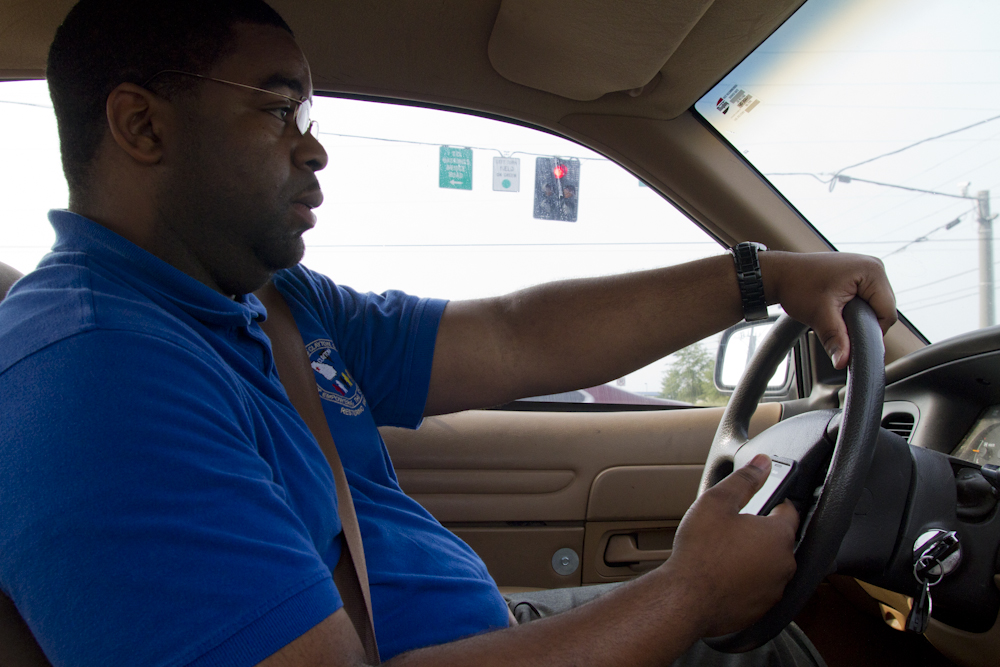
For Rollins, the kids are just a click away. The addresses for the 20 kids he supervises are plotted on his iPhone's Google Map app.
“Are you going to read it,” Rollins asks, pointing to Marko’s letter to his mother.
“What? In front of the judge?”
“Yeah. It may help,” Rollins says with a shrug. “But it’s your call.”
“You know I’m kind of nervous to do it in front of people…”
Gang life brought with it the crazy lifestyle Marko wanted, but also a sobbing mother and a designated felon status. His mother disapproves, to say the least, breaking down in tears during their last visit.
“She don’t want no son as a gang banger,” Marko says.
Anyone convicted of gang-related offenses automatically earns the designated felon title, and the chance of spending up to five years at one of the state’s six Youth Development Campuses (YDC).
“I really see a lot of potential in Marko,” Rollins says. “He’s just a complete 180.”
Later Rollins pulls the old department-issued Crown Victoria out of the RYDC parking lot as he thumbs through his iPhone. All the kids he supervises are stored in his phone, with their addresses plotted out on his Google Maps app, and just a click away.
Curriculum, straight from the e-book.
Clayton County’s Virtual Alternative School is new, and unique, and Rollins is still trying to get used to it.
This fall is the first semester it has been put to use. Each student was given a laptop to complete the majority of their course work from home. Rollins says it’s helping to break up the kids from one central location.
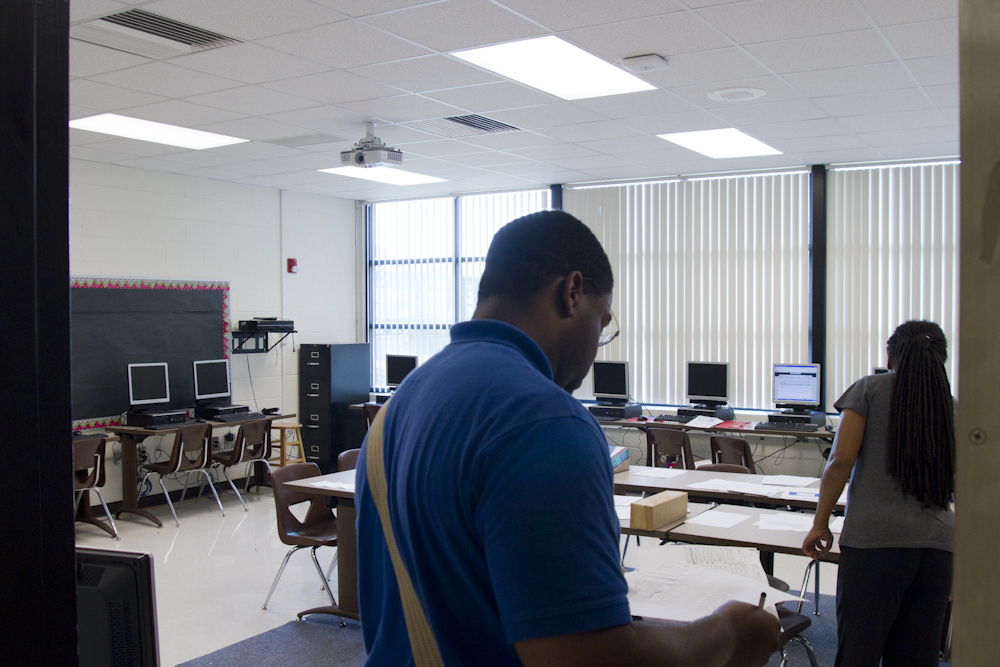
Students of the Clayton County Virtual Alternative School have the freedom to complete their course work on their own schedule, to an extent.
Alternative schools are made up of students suspended or expelled from their home district. They offer an option, usually mandated by the school, for students to continue their studies.
For probationers, school attendance is mandatory, unless specifically approved to attend a GED or other education program.
“A lot of schools spend too much time trying to teach testing or handle discipline,” Rollins says. “If you’re a problem-child you may get suspended for 10 days just to get them out of the teacher’s hair.”
Likewise, discipline is always an issue in alternative schools, where the "get out of my hair" kids go. The virtual academy format diminishes some problems.
A student’s work is monitored by 10 virtual teachers. Students are required to spend a minimum of 20 hours on schoolwork and at least six hours of “face time,” or time face-to-face with a teacher in an actual classroom, each week.
Alternatives, and the road back to the classroom.
Derek*, 14, is still in pajama pants when he answers Rollins’ knock at his front door a little before noon.
“You just waking up?” Rollins quips, half joking.
“Nah, I’ve been up,” Derek says, still rubbing his eyes.
Seconds later he’s back at the door with his school-issued laptop updating Rollins on his course work. One of the benefits of the virtual academy, for students at least, is the flexibility to sleep in and still get their work done.
Like Marko, Derek has been assigned to report to the Evening Reporting Center (ERC) during the week. He likes the program, he says, but questions its effectiveness. He spends the majority of his time at the ERC playing basketball and little completing the work they assign, he says.
“You know that’s not what it’s really about, right?” Rollins asks with a smile.
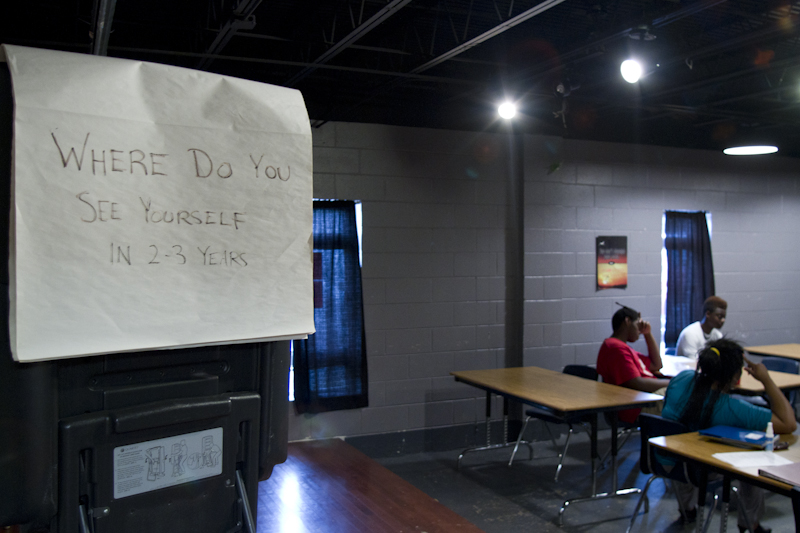
Kids report to Clayton County's Evening Reporting Center weekday afternoons in a bid to keep them off the streets during peak time hours. (File photo, May 17, 2011.)
He knows. The program’s main goal is to keep him off the street, he says, adding he’s a bit concerned about getting back into trouble now that one of his old friends has moved into the neighborhood.
“It ain’t that I’m trying to stay out of trouble,” Derek says. “It’s that I don’t have time to get in trouble.”
Derek is scheduled to complete his stay in alternative school at the end of December, but like every student he still has to earn his way out. That means passing at least six of his eight classes and accumulating a minimal number of disciplinary write-ups and absences.
For now, he enjoys the luxuries of starting class at a quarter till 12, but he’s a little worried about life after December. He’ll be returning to Lovejoy High School, where his troubles started, with a schedule of early morning classes.
When the hard work pays off.
“To be honest, this job is more fun than anything if you’re good with kids,” Rollins says. “The fact that I’m still young myself helps, so I can relate to the kids.”
Rollins, 27, prides himself on the fact that he has only overseen three or four kids that got sentenced to any kind of “serious time” since taking over the beat three years ago.
That’s just a handful of kids out of a caseload of more than 200.
“In Clayton County we do things a little differently,” he says. “Through education we reduce recidivism."
Names have been changed to protect the identity of juveniles.
Photo credits: Clay Duda/JJIE.org
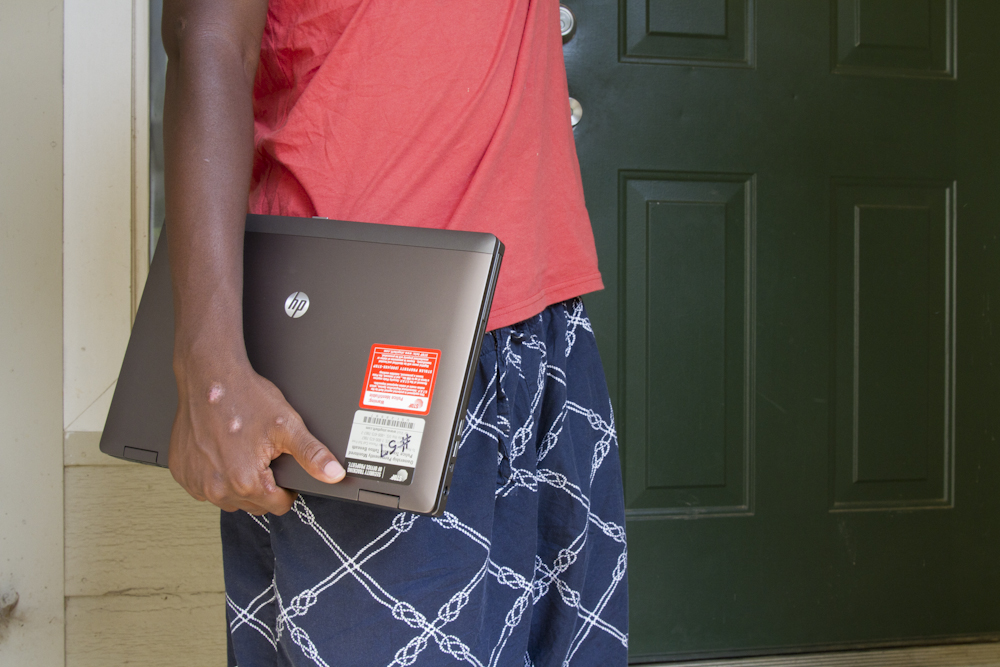
I was in the Clayton country juvenile detention center approximately 50 years ago. My Mother passed away when I was 13 and I became very rebellious because no one in my family wanted to raise me. I was once told I was most likely to end up in prison. After staying there about 8 months, I was transfered to Macon YDC and later to a group home in Atlanta.
Alot happen after that, I never did go to prison. I became a Paramedic, a Mother and much later a Grandmother.
I always said when I grew up I was going to become a guard at the local JDC, the ladies there helped me believe in myself and were the reason I did as well as I did. Even through I took a different route, I did pretty good for myself.
I just wanted to write this and tell my story. The ladies that interact with the girls in the day area make a HUGE difference in how the detainees turn out. Hats off to these ladies. I wish I could let them know how much they did for me, considering I’m 65 yrs old, I’m sure they wouldn’t remember me.
Great article, but an even greater Guy! I have personally worked with Mr. Ronaldi Rollins and he is passionate about the work he does on behalf of the kids who come in contact with the Juvenile Court of Clayton County. He is a harder worker. It doesn’t surprise me that he would be featured in a story such as this. The cream always rises to the top!!!! Keep up the great work!!!! Greatness Lies Within!!!
Great inside look at the juvenile probation system. These guys are on the front-lines helping these young men navigate the juvey system without ruining their lives. Thanks for sharing this!